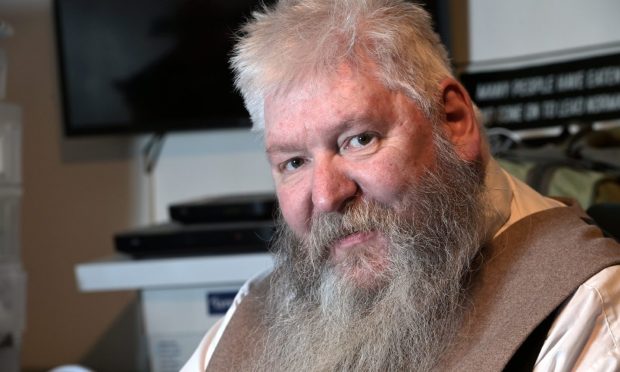The ring of his phone momentarily distracted Alan Bithell from the dark clouds that were gathering.
It had been a long, tough night.
Wracked with physical pain and feeling hopeless, he felt that there was no coming back from this.
A serious back injury and degenerative arthritis, combined with a long battle with post-traumatic stress disorder, had left Alan feeling like he didn’t want to be here anymore.
He picked up the phone and heard the voice of his neighbour, Lyle.
Lyle needed help drafting a letter and Alan had helped him out with some tech advice in the past, so he thought he’d be able to pitch in again.
Alan said: “I showered, got dressed and went around to help.
“After we finished the letter, I remember going home and making a coffee.
“I sat down and it hit me, I no longer felt depressed.
“That was a lightbulb moment for me. Now I try to help people wherever I can, it’s a form of self-defence from my mental health problems.”
Learning the right way to respond to the darkness
That was eight years ago.
Alan’s revelation prompted him to get involved with Highland mental health charity Spirit Advocacy, going on to serve as its chairman.
He also joined his local community council in Golspie and studied for a qualification in mental health peer support at UHI.
Alan, 60, said: “Everything followed from that moment helping Lyle.
“Don’t get me wrong, I still get those dark thoughts now.
“But it’s not about whether or not the thought occurs. What matters is what I do about it.
“Do I dwell in that place or find something to get myself out of it? I judge my recovery on how easily I can get out of that thought pattern.”
Alan’s physical health played a big part in his later struggles.
A bad fall on the ice as he walked home from work a decade ago left him with a broken back and it took years for his injury to be properly diagnosed.
When it eventually was, a doctor concluded he’d been suffering from ankylosing spondylitis – a serious condition which causes inflammation of the spine – from around the age of 14.
Pain and health struggles added pressure
That pain is just something Alan has to live with.
And his mental health struggles have been going on for some time.
Growing up in Oldham, near Manchester, his father suffered from PTSD after serving in the Second World War.
Alan served in the RAF and various other jobs took him around England and to Germany and Saudi Arabia.
Returning home to work as a signalman on the railway, he found himself working all hours of the day combining his job with caring for his disabled mother.
If I can talk about my situation and help someone, I’m happy with that.”
That career ended when he suffered two transient ischaemic attacks, often referred to as “mini-strokes”, before his 40th birthday.
Fond memories of Kinloss from his time in the RAF prompted his move north and he eventually settled in Golspie.
He lives a less stressful life now and tries to be as open as possible about his own struggles.
What more can be done?
Living in the Highlands, Alan has seen how much discussions about suicide prevention have become part of the region’s fabric.
He believes the health service can only do so much, and the onus should be on the rest of our society to pick up the slack.
Alan said: “These problems are real and we’ve all got to do what we can about it.
“All these things that happened to me, they’re a part of who I am now.
“But I’m still constantly trying to develop new coping methods. I’ve just got a new puppy and that’s effectively one.
“If I can talk about my situation and help someone, or give them the confidence to talk about how they’re feeling, I’m happy with that.”
How to get help
It is so important that if you are having thoughts of suicide, you reach out to someone.
Hug (action for mental health) is a network of people living in the Highlands who have experience of mental ill-health. It is a part of Spirit Advocacy and can be reached on 0300 365 9366.
There are a number of other local and national groups offering support in time of crisis or mental distress.
- James Support Group – 24 hours a day on 07563 572 471
- Mikeysline – 07786 207755 (Sunday to Thursday 6pm – 10pm, Friday to Saturday 7pm – 7am)
- Samaritans – 116 123 (calls are free and do not show on a phone bill)
- Breathing Space – 0800 83 85 87 (Monday to Thursday 6pm – 2am; Friday 6pm to Monday 6am)
If you are concerned about someone else don’t be afraid to ask, “are you OK?” and help them to get help.
This story is the third of a three-part series on suicide prevention in the Highlands.
Its goal is to shine a light on the issue and to provide a message of hope to people who are struggling themselves.


Conversation